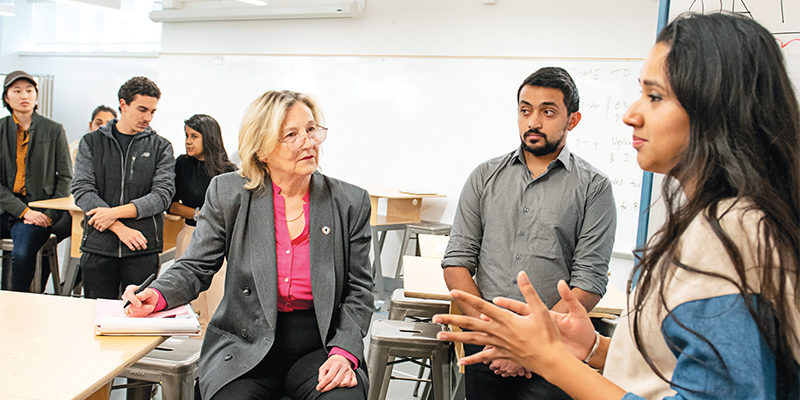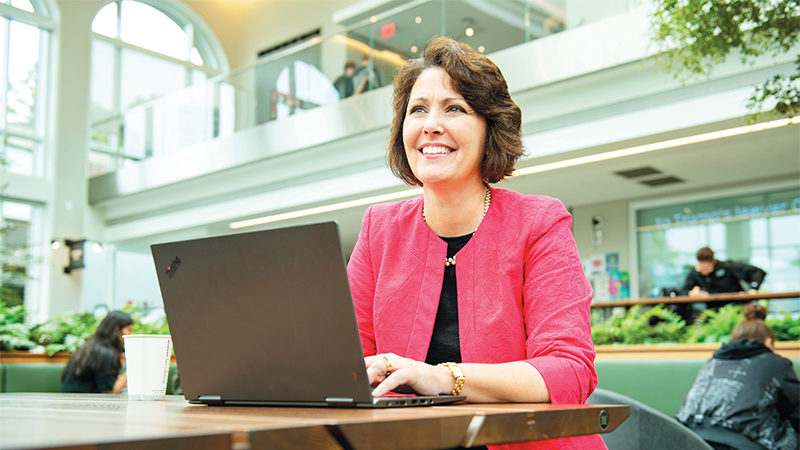
Photo: Webb Chappell
A Different Definition of Entrepreneurship
At Attitudes Dance and Fitness in Billerica, Massachusetts, Associate Professor of Entrepreneurship Brad George, who is the co-owner and chief financial officer, considers himself “a behind-the-scenes jack of all trades.” While co-owner and artistic director Dawn George oversees ballet, jazz, contemporary dance, hip hop, and tap classes for children along with dance and fitness classes for adults, Professor George handles business and marketing strategy along with accounting responsibilities. By bringing his experiences back to the classroom, he hopes to impart knowledge about all aspects of owning a business.
“Students think about the big, glamorous businesses; most startups are not big or glamorous,” Brad George says. “Even with a relatively small business, you deal with a lot of the same issues, things you don’t necessarily read about.” For example, he says the pressure of finding new space after their building was sold almost led the Georges to close their business.
In owning the dance studio, Brad and Dawn George have put their business first and have dealt with making sacrifices, which is a key lesson he has conveyed to his students.
“Most businesses require you to put most of your time and money and everything else into them,” Brad George says. “You don’t want to get in there and realize: ‘This is not at all what I thought it was going to be.’”
He also asks his students to determine what they hope to get out of their ventures. For Brad and Dawn George, their focus is on serving the community. “We have a very different set of goals for our business than other people might,” Brad George says. “I’m a big believer that entrepreneurship isn’t about making the most money; it’s about having a life you want to live.”

Senior Lecturer Caroline Daniels teaching in the Design Zone at Babson College.
Photo: Webb Chappell
Lessons from Overcoming Challenges
For more than 20 years, entrepreneurship senior lecturer Caroline Daniels managed Daniels Island Properties in Nantucket, a company that built and purchased properties on the island and rented them out to vacationers during the summer months.
On most summer days, Daniels would be in constant contact with architects, building contractors, and real estate professionals responsible for marketing her properties. At the end of each summer, Daniels would close up shop for the winter.
“In any business, you run experiments,” says Daniels, who also has started other ventures, most notably in strategy consulting. “You have to find a really good niche to operate in, and you need to have great customer supplier and other stakeholder relationships.”
When she returned to Babson each fall, Daniels would share stories of how she overcame adversity in her business. Her most frequent tale, she says, involved an early morning delivery of incorrect parts for a home soon to be constructed. She has told her students how she solved the problem by involving everyone as a team to find a solution.
The experience of overcoming a challenge can serve as an inspiration and a how-to for students, Daniels says. “The joy for me in combining both practical, entrepreneurial experience and academic teaching is that I get to share everything I’ve learned with students and give them a pathway. I feel that reduces the risk for them.”

Sandra Bravo MBA’87 working on her consulting business, Bravo Communications.
Photo: Webb Chappell
Getting the Students Involved
For the past 25 years, marketing lecturer Sandra Bravo MBA’87 has helped small businesses grow through her consulting business, Bravo Communications.
“I understand the entrepreneurial mindset,” she says. “It’s fun to have a front-row seat to see what these people accomplish.”
At the same time, Bravo has done volunteer work and occasionally has merged her professional and pro-bono lives. Most recently, she has worked with Friends of Children Inc., a Western Massachusetts organization that helps foster children receive supplies and money for things they need, in addition to easing the transition out of foster care once they turn 18.
Bravo has involved her past students by having them help Friends of Children build its social media presence. Students also have been tasked with creating content calendars and generating marketing ideas.
“It’s hard to explain how important this work is, and how much my Babson students stepped up to the plate,” she says. “We have students who are smart and compassionate, and they know they have the ability to have a voice. It’s so energizing and gives me so much hope for the future. Once the students get invested in something, they know they have the resources to fix it. That equation can add up to amazing things that can be done for the world.”
